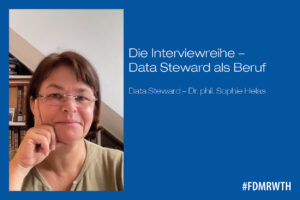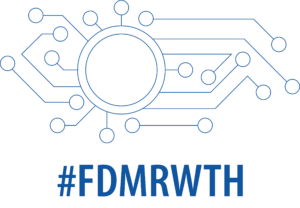In the second part of our series, we have prepared an exciting interview with archaeologist Dr. phil. Sophie Helas, who has been working as a Data Steward at RWTH Aachen University since 2021. We have summarised for you what her motivation was to apply as a Data Steward, what her field of work is like and the challenges she faces in her everyday life.
Ms Helas, please describe your particularly important cornerstones of your previous professional career.
I began my studies in Classical Archaeology, Ancient History and Italian Romance Studies in Cologne in 1989 and graduated with a Master’s degree in Classical Archaeology in 1997. I then won a doctoral scholarship from the Gerda Henkel Foundation and was awarded a doctorate in Classical Archaeology in 1999. This was followed by a position at the University of Giessen, a one-year travel grant from the German Archaeological Institute (DAI) and a position at the DAI Rome for six years. After that, I, now a mother of two daughters, headed a DFG project in Gabii/Italy from the University of Bonn for six years and finally a three-year research project of the Gerda Henkel Foundation in Selinunte/Sicily.
I came to RWTH Aachen University in October 2021, to the Chair of Architectural History as part of the DFG project baureka.online.baureka.online is a project idea for Research Data Management that originated here at RWTH and was applied for by Professor Anke Naujokat, as one of three applicants.
After my dissertation, I always worked as a researcher, usually on research projects that were linked to archaeological excavations. This generates a lot of research data, the preservation and management of which is of central importance, because excavating means destroying. Collecting and saving important information during the excavation in order to be able to evaluate it afterwards requires systematics, discipline and patience. But without this data, neither evaluation nor publication is possible.
So I have always managed my research data before I came to so-called research data management. For example, more than 25 years ago I built up a (later relational) database for archaeological excavations with the FileMaker application (version 2.1!) and constantly developed it further. It is still running, by the way.
What was your motivation to apply as a data steward?
The Aachen project position appealed to me very much because I know from my own experience the necessity of storing research data in a structured way and making it accessible. I also have a soft spot for architecture and I have always worked on architectural topics as an archaeologist.
I find the approach of developing the research portal in close consultation with the specialist community particularly promising, as I have already had the experience that people working in science are presented with ready-made concepts that then turn out to be unsuitable for practical use and are more annoying than helpful. This meant they had no future. It excites me to work on the development of this portal, which will satisfy scientific demands as well as be user-friendly and visually attractive. That was the real motivation: to put the cart by the user so that the horse runs well.
Can you describe your current tasks as a data steward?
My tasks in the team are project management, i.e. organising meetings, workshops and conferences, public relations, which includes maintaining our homepage, and maintaining contacts, especially with the members of the Scientific Advisory Board. In addition, I can incorporate my practical experience with similar research data into the evaluation of our project, which is being developed jointly with the TU Berlin and FIZ Karlsruhe. In this way, I check whether, for example, the metadata model also works in practice and whether it satisfactorily describes the respective research object. So my job is also (unfortunately) to be constantly critical.
What are the particular challenges in the role of data steward?
The research data on historical building research should not only be stored securely in the long term, but should also be findable for possible subsequent use – not an easy undertaking, since we also want to make external data from other repositories accessible.
A particular challenge will be to gain the trust of the specialist community in order to establish baureka.online as the research data portal for historical building research. I think we will have to convince with quality above all. But a lot will also depend on communication; we have to find the right language and think in a very user-oriented way.
Thank you very much for the interview and the exciting insights!
Learn More
Did you like the insight into the profession of a Data Steward? Then feel free to leave a heart! ♥️
If you have any questions about Data Stewards or about RDM in general, simply write a message to the IT-ServiceDesk. The RDM team looks forward to hearing from you.
_______
Responsible for the content of this article are Dr. phil. Sophie Helas and Lina-Louise Kaulbach.






Leave a Reply
You must be logged in to post a comment.